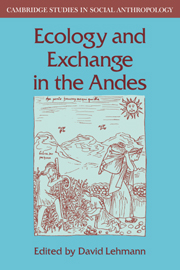Book contents
- Frontmatter
- Contents
- List of contributors
- Acknowledgements
- The Andean region: relief
- The Andrean region showing ecological levels (after Troll 1968)
- 1 Introduction: Andean societies and the theory of peasant economy
- 2 The role of the Andean ayllu in the reproduction of the petty commodity regime in Northern Potosí (Bolivia)
- 3 Labour and produce in an ethnic economy, Northern Potosi, Bolivia
- 4 ‘Resistance to capitalism’ in the Peruvian Andes
- 5 Production and market exchange in peasant economies: the case of the southern highlands in Peru
- 6 The Andean economic system and capitalism
- 7 Property and ideology: a regional oligarchy in the Central Andes in the nineteenth century
- 8 Multi-levelled Andean society and market exchange: the case of Yucay (Peru)
- Glossary
- References
- Index
- Cambridge Studies in Social Anthropology
1 - Introduction: Andean societies and the theory of peasant economy
Published online by Cambridge University Press: 29 September 2009
- Frontmatter
- Contents
- List of contributors
- Acknowledgements
- The Andean region: relief
- The Andrean region showing ecological levels (after Troll 1968)
- 1 Introduction: Andean societies and the theory of peasant economy
- 2 The role of the Andean ayllu in the reproduction of the petty commodity regime in Northern Potosí (Bolivia)
- 3 Labour and produce in an ethnic economy, Northern Potosi, Bolivia
- 4 ‘Resistance to capitalism’ in the Peruvian Andes
- 5 Production and market exchange in peasant economies: the case of the southern highlands in Peru
- 6 The Andean economic system and capitalism
- 7 Property and ideology: a regional oligarchy in the Central Andes in the nineteenth century
- 8 Multi-levelled Andean society and market exchange: the case of Yucay (Peru)
- Glossary
- References
- Index
- Cambridge Studies in Social Anthropology
Summary
Capitalist unity and peasant diversity
The common theme of this book can be condensed into one question: in what ways has the impact of market penetration and capitalist development on peasant economy and haciendas in Andean countries been shaped by a heritage of political culture and the characteristics of ecology and climate?
The relationship between capitalism and peasant economies has been the object of much abstract theoretical discussion based on case studies carried out the world over. Evidently such theories describe processes only in very general terms, and inevitably local characteristics will condition the interactions of variables which the theories predict. In the case of Andean societies, however, these local characteristics are often understood to be much more than mere conditioning factors, impinging marginally on universal processes: perhaps the Andean system of reciprocity (Mayer 1974b), and the constraints on and opportunities for political power and economic complementarity accorded by the region's ecology and climate, offer better explanations of social and economic organization than would a general theory of peasant economy. In this book the reader will find arguments for both views, as well as attempts to reconcile the two.
The issue is further complicated when we remember that ‘peasant specificity’ is an inherent feature of any theory which accounts for the consequences of the encounter between peasant production and capitalism. Peasant economies are almost by definition ‘provincial’, subject to the operation of local rules of kinship, land tenure and other crucial institutions.
- Type
- Chapter
- Information
- Ecology and Exchange in the Andes , pp. 1 - 26Publisher: Cambridge University PressPrint publication year: 1982
- 4
- Cited by



